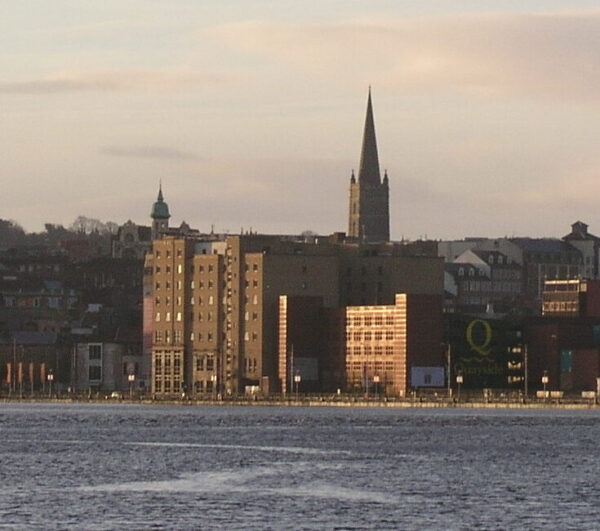 A NEW City deal for the North West has the potential bolster industrial and digital capabilities, creating 7,000 jobs.
A NEW City deal for the North West has the potential bolster industrial and digital capabilities, creating 7,000 jobs.
The Derry-Strabane City Deal is an unprecedented programme of capital funding, worth £250 million (€290 million), which has the potential to transform the northwest region.
It marks the single largest ever government investment in the area.
A total of £210 million comes from the UK government (50 per cent ) and the NI executive (50 per cent ) and is in response to a bid submitted in 2018 by a range of partners within the city, led by the council.
A number of the key partners will contribute a minimum of £40 million, bringing the overall investment to £250 million.
These include Ulster University, the Western Health and Social Services Trust, the North West Regional College and C-TRIC.
The delivery of Centres of Innovation and Research at Ulster University in artificial intelligence and data analytics (CARL) and robotics and automation (CIDRA), together with the key smart/ digital city and region initiatives, as well as the delivery of the School of Medicine at the Magee campus and the creation of a Health Research Institute (HRI) are among the major projects.
Key generation projects include the provision of mixed use civic, health, leisure and educational facilities in Strabane town centre.
In Derry the creation of an interactive maritime attraction and an enhanced walled city tourism experience, as well as major regeneration investment along the riverfront and Queens Quay in Derry, will be closely linked to the expansion of the university.
In an interview with The Irish Times newspaper, John Kelpie, chief executive with Derry City and Strabane District Council, says as the fourth-largest city region on the island, Derry has a talented population, with 35 per cent of those under 25 years.
“It’s brimming with talent and that talent is key, our primary resource. It’s a beautiful place, a green city, there is a good quality of life and the value proposition from an investment perspective is excellent. Housing prices remain competitive and office rental is competitive.
“Fifty per cent of intake in companies are from returnees and there is a very talented diaspora who are seeking opportunities to come home.
“This is a pre-Covid phenomenon for us,” he says.
While the city did not vote for Brexit, Kelpie now sees it as an opportunity to be grabbed with both hands.
“Now that it’s happened we are understanding the opportunity. We are the only city region that straddles the UK and EU, offering businesses the opportunity to establish either side of the Border effectively within the same city region with the same workforce.
“We are seeing companies avail of that straight away and it’s a big selling point for us at the moment,” he says.
President of the Derry Chamber of Commerce, Dawn McLaughlin, says the City Deal has the capacity to significantly bolster industrial and digital capabilities and has the potential to create more than 7,000 jobs over the next decade.
“The northwest has historically been underfunded and underinvested in, with disproportionately high levels of unemployment and deprivation. This is an opportunity to address these inequalities and boost our economy, especially at such a difficult time for the economy,” she says.
The City Deal will help strengthen the northwest’s growing reputation as a leading location on the island of Ireland for sectors like tech, health and life sciences, and academic research and innovation.
In particular, the deal builds on existing strengths in health tech and diagnostics, leveraging new and emerging technologies like AI and robotics.
“From a commercial and business point of view, there are still a number of issues or challenges for the northwest’s economy.
 “Not unique to our region of course but the pandemic continues to be the number one challenge for our businesses.
“Not unique to our region of course but the pandemic continues to be the number one challenge for our businesses.
“While it’s positive that our economy is beginning to reopen, the recovery effort will be slow, painful and will require committed government support.
“Other challenges include improving our regional infrastructure and ensuring we have strong connectivity to other important economic centres across these islands; continued uncertainty over Brexit and the NI Protocol.
“However, it is largely our experience that businesses here are quietly getting on with the new arrangements and many are keen for the Executive to fully grasp the opportunities which are there for Northern Ireland; and boosting our skills capacity and preparing the next generation of workers for the ever evolving world of work,” she adds.
Tags:




